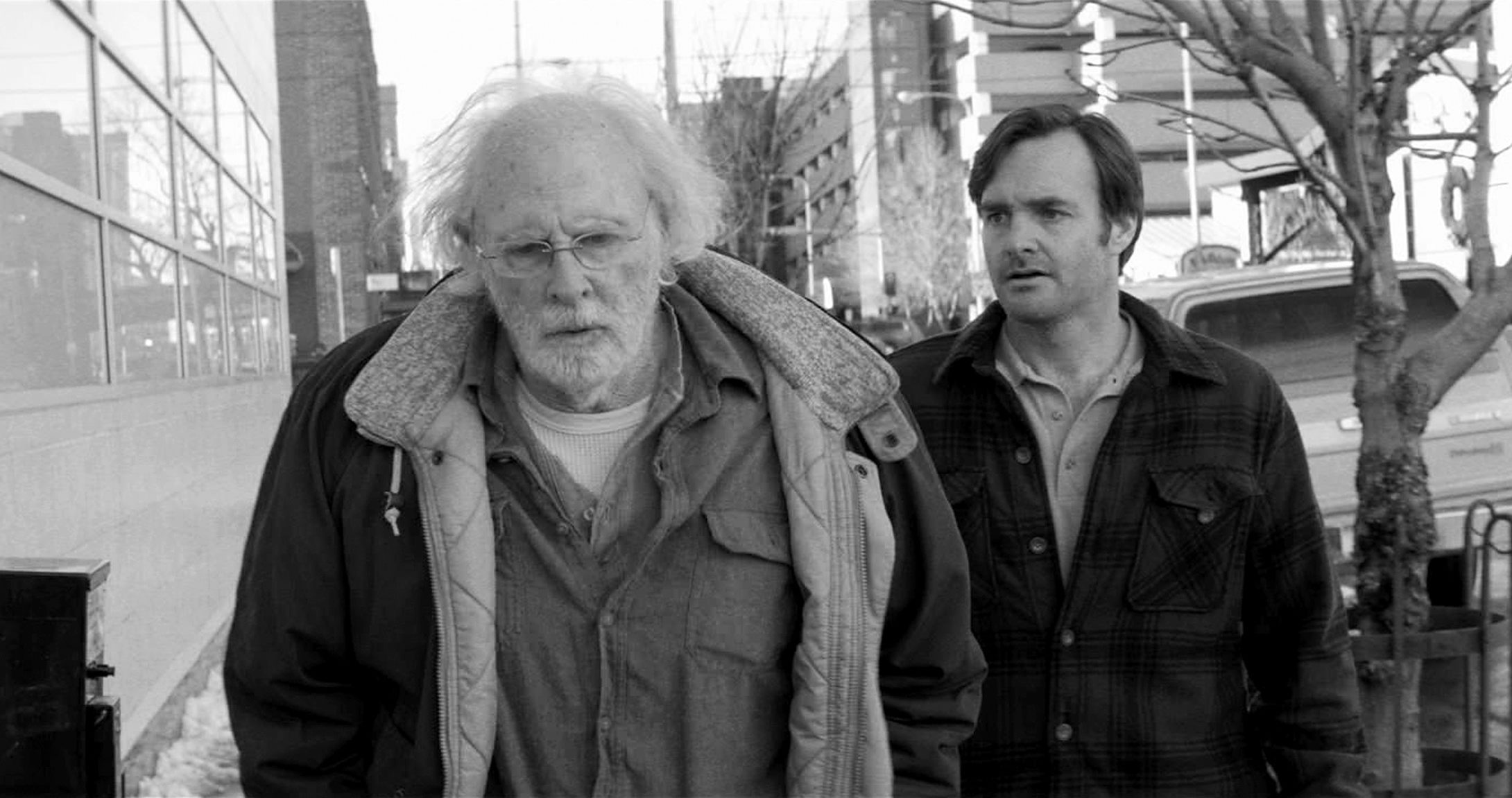Nebraska oscillates between being a relatable study of aging middle America and a coastal account of what they believe happens in the heartland. Director Alexander Payne brilliantly shoots (in black and white) the small downs and ceaseless horizon, creating a sense of laziness and slow movements, but outside of his two leads, Payne (and writer Bob Nelson) do a poor job showcasing real people and mostly opt for caricatures. The tug and pull between artifice and reality gives Nebraska a disjointed meandering feel that is partially intentional but mostly distracting.
Woody Grant (Bruce Dern) keeps walking (since he is forbidden to drive) towards Nebraska from his home in Billings only to be picked up by police everyday. Woody does this because he believes he has won a million dollars (it is obviously a scam) through a letter in the mail. To shut him up and get him away from his mother (June Squibb), Woody’s son David (Will Forte) takes his dad to Lincoln, stopping along the way in Woody’s hometown to learn more about the man his dad once was.
Alexander Payne is actually from Nebraska. His intention here is not to lament the downfall of the hard-working middle of the country, but to show how similarly stubborn and crazy people from the middle are as opposed to the coasts. It’s in the little details Payne gets it right. TV (especially sports) are watched almost ritually. Stories spread like wildfire since everyone knows everyone in a small town. There is a story about an air compressor that has several different versions because people have chosen to believe their idea of events. The façade of likeability that fades as you get older or get around people who know you. Most of these details when tied to someone (Buddy or Dave usually) give Nebraska a clever understanding of how the world functions in a small town. However, Payne often undercuts himself with simplistic portrayals of a cousin who has obvious criminal tendencies or Kate’s (Dave’s mother) overt truth-telling. Had Payne had some restraint, Nebraska would have succeeded more. Perhaps his time in Hollywood has dulled his memory of where he came from.
However, Payne (and writer Nelson) nail the father/son relationship. Most people have had a relative at some point who is coming close to losing it mentally, and Nebraska shows the plight of the people forced to take care of the now helpless. You can see in Dave’s conversations with his dad that Woody never fully appears quite there anymore; he really has to push his dad to give up any information about his past, and even that doesn’t work well since Woody’s memories are mostly shot. Watching a relatively nice patient person forced into frustrating circumstances because of an unresponsive aging loved one gives Nebraska a very ubiquitous feel and understanding beyond time, and results in the strong payoffs of the third act, especially for Dave.
As Woody, Bruce Dern walks the tightrope of being sympathetic but not likable. The “lost” look on his face helps make up for some of the really mean words he uses towards Dave, Kate, and anyone who gets in his way for his million dollars. This balance is hard to maintain, and Dern does a great job at it. However, to me, the surprise and strength of this film is MacGruber himself (one of his SNL characters), Will Forte. Watching him many years on Saturday Night Live, Forte never gave any indication that he had these levels of dramatic acting inside himself. Forte gives Dave the right mixture of patience, likability, and inner self-awareness. Nebraska is at its best when Dave and Woody are traveling across the Midwest together. June Squibb gets the scene-stealing Payne role here, but she goes too far over the edge to be taken seriously as a character. Stacy Keach isn’t bad as an old acquaintance of Woody’s, and probably doesn’t get enough screen time. Bob Odenkirk needed more time as well as Dave’s older brother.
Shot in beautiful black and white, Nebraska is meant to make the audience think of an older simpler time that is often looked upon with rose-colored lenses. However, Alexander Payne undercuts the nostalgia with some biting satire around what has become of the relics of that era. He then undercuts his satire with broadly drawn types that lessen the impact of the film. Seriously, how many old people can live in 1 small town? I counted 3 people under the age of 60. I did find out one interesting piece of information though: I guess Nebraskans get Chicago Bears games on TV; good to know the Bear fan base exists across the Midwest.

